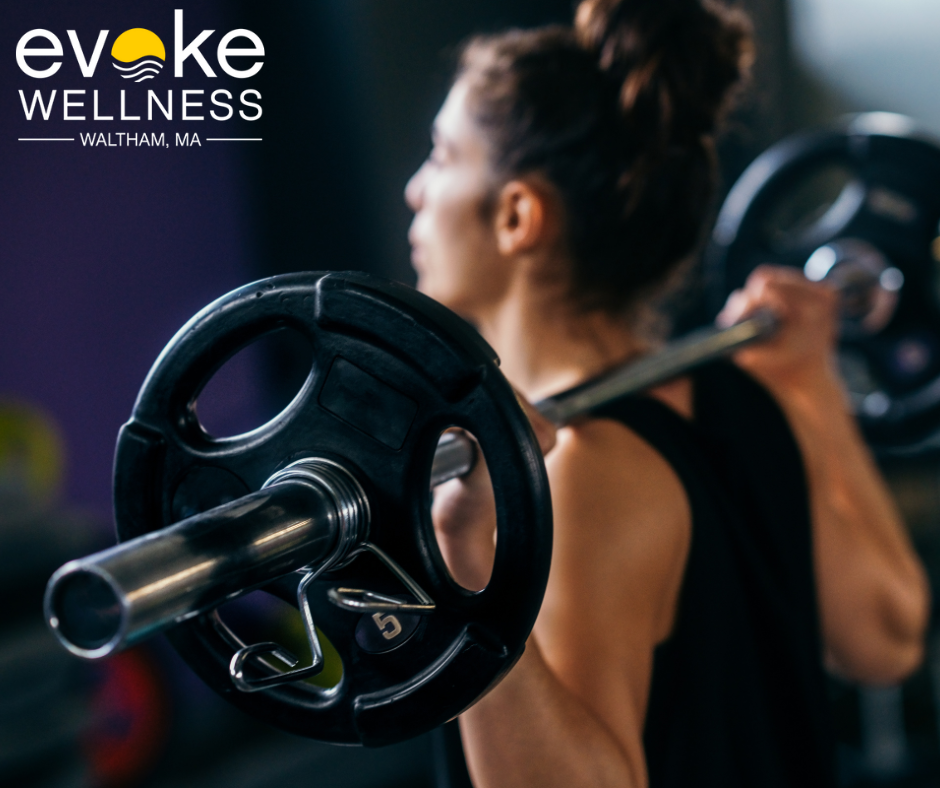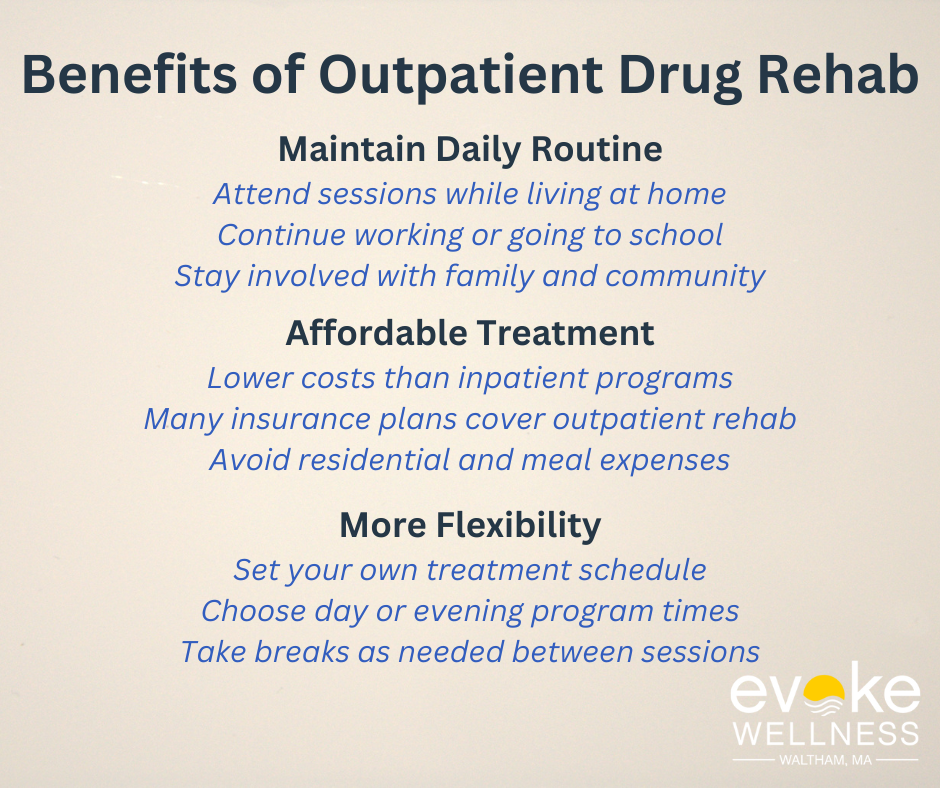Are you or a loved one struggling with substance abuse? Outpatient drug rehab could be the solution you’re looking for. This flexible treatment option allows you to receive vital support and therapy while maintaining your daily responsibilities. Unlike inpatient programs, outpatient rehab lets you return home each day, keeping you connected to your support network. But is it the right choice for everyone? In this article, we’ll explore the ins and outs of outpatient drug rehab, including its benefits and potential drawbacks. You’ll gain a clear understanding of what to expect and whether this path to recovery aligns with your needs and lifestyle.
Call us at (833) 287-7223 today or reach out online.
What is Outpatient Drug Rehab?
Outpatient drug rehab provides therapy and support on a part-time schedule. Rather than living at a treatment facility, you attend appointments and counseling sessions a few times per week.
Benefits
- Maintain work, family, and life obligations
- Lower costs than inpatient programs
- Transition back to normal life
- Ideal for mild addictions
Drawbacks
- Lacks 24/7 supervision and medical care
- Risk of falling back into drug use environment
- Less intensive than inpatient rehab
- Self-motivation required to stay sober
Outpatient programs offer flexibility to recover from addiction while keeping established routines. However, they require dedication as you’ll encounter drug triggers in your daily life. Evaluate your situation to determine if this level of care meets your needs.
Benefits of Outpatient Drug Rehab
Outpatient drug rehab offers several key advantages that make it an attractive option for those seeking treatment.
Maintain Daily Routine
- Attend sessions while living at home
- Continue working or going to school
- Stay involved with family and community
Affordable Treatment
- Lower costs than inpatient programs
- Many insurance plans cover outpatient rehab
- Avoid residential and meal expenses
More Flexibility
- Set your own treatment schedule
- Choose day or evening program times
- Take breaks as needed between sessions
With its convenience and cost-effectiveness, outpatient rehab empowers you to get comprehensive care while still managing other life responsibilities. Its flexibility makes recovering from addiction more accessible.
Types of Outpatient Drug Rehab Programs
There are several types of outpatient rehab programs to choose from. Determining which is best depends on your needs.
Night Treatment Programs (Night Treatments)
Night Treatments provide a higher level of care with more frequent meetings – typically 3-5 days per week for 2-4 hours each session. They offer:
- Group therapy
- Individual counseling
- Education on addiction
Day Treatments (Day Treatments)
Day Treatments are the most intensive outpatient option, meeting 5-7 days per week for 4-8 hours per day. Services include:
- Medical monitoring
- Therapeutic activities
- Comprehensive treatment
Standard Outpatient Programs
Standard programs meet 1-2 times weekly for a few hours of counseling and education sessions. Good for:
- Continuing care after inpatient/intensive program
- Those with mild addictions and strong support systems
How Much Does Outpatient Drug Rehab Cost?
The cost of outpatient drug rehab programs can vary widely. Factors like location, treatments offered, and duration all impact the overall expense. Typically, outpatient rehab is more affordable than inpatient care.
Factors Affecting Cost
- Program length – outpatient programs from 1-3 months are common, with longer durations costing more.
- Services included – costs rise with additional therapies like counseling, medication management, etc.
- Insurance coverage – many plans cover some outpatient rehab costs partially or fully.
Average Ranges
- Basic programs around $1,500 – $10,000 for 3 months.
- Intensive outpatient programs $3,000 – $15,000 per treatment episode.
- Partial hospitalization programs $7,000 – $20,000 per 3 month period.
Many rehab centers offer financing plans to make outpatient care more accessible. Inquire about payment options, insurance benefits, and ways to reduce out-of-pocket expenses.
Is Outpatient Drug Rehab Effective?
Outpatient drug rehab can be highly effective for those with a strong support system and commitment to recovery. Its flexibility allows you to maintain work, family, and daily responsibilities while receiving treatment.
Advantages
- More affordable than inpatient programs
- Ability to apply coping strategies in real-world settings
- Avoids disruption to your normal routine
Potential Drawbacks
- Requires exceptional self-discipline to avoid triggers
- Less intensive than inpatient rehab
- Success depends heavily on your home environment
With outpatient care, much responsibility falls on you. But with dedication and the right program tailored to your needs, outpatient rehab can be a viable path to sobriety.
Key Benefits
- More affordable than inpatient programs
- Ability to apply coping skills in real-world settings
- Support system of family and friends
Treatment Options
Outpatient programs vary in intensity and services provided. Popular options include:
- Regular counseling sessions (individual/group therapy)
- Medication-assisted treatment
- 12-step program participation
- Periodic drug testing
Finding the Right Fit
Look for programs tailored to your specific needs – whether that’s dual diagnosis treatment, gender-specific groups, or services in your preferred language. Building a strong rapport with counselors is also key for successful recovery.
Frequently Asked Questions About Outpatient Drug Rehab
What is outpatient rehab?
- An outpatient program allows you to live at home and attend treatment sessions during the day or evening. This provides flexibility to maintain work, school, or family obligations.
Who is it suitable for?
- Outpatient care is ideal if you have a strong support system at home and a relatively mild addiction. It requires dedication to avoid relapsing when not in treatment.
What are the benefits?
- More affordable than inpatient rehab. You can continue fulfilling daily responsibilities. Programs offer counseling, support groups, medication management if needed.
Are there any downsides?
- You’ll have less supervision and structure compared to inpatient care. There’s greater temptation and access to drugs/alcohol in your usual environment. Intensive programs require a major time commitment.
How long does it last?
- Program lengths vary, from a few hours per week over several months, to full days for 30-90 days. Duration depends on your needs and progress.
Conclusion
As you consider your options for drug rehabilitation, remember that outpatient programs offer a flexible and effective path to recovery. By allowing you to maintain your daily responsibilities while receiving treatment, these programs empower you to build a sustainable, sober lifestyle. The combination of therapy, support groups, and real-world application of coping skills can be incredibly powerful. However, it’s crucial to honestly assess your needs and circumstances. While outpatient rehab isn’t suitable for everyone, for many, it provides the perfect balance of support and independence. Ultimately, the most important step is taking action towards recovery – whether through outpatient care or another approach that fits your unique situation.
Begin Your Journey with Evoke Wellness at Waltham
If you or a loved one is considering outpatient treatment, Evoke Wellness at Waltham invites you to contact us. Our compassionate team is ready to answer your questions, discuss your needs, and help you take the first steps toward recovery. At Evoke Wellness, you will find more than just a treatment program – you’ll discover a community dedicated to your wellness and success. Together, let’s embrace the journey to recovery and the promise of a new beginning. Call us at (833) 287-7223 today or reach out online.



